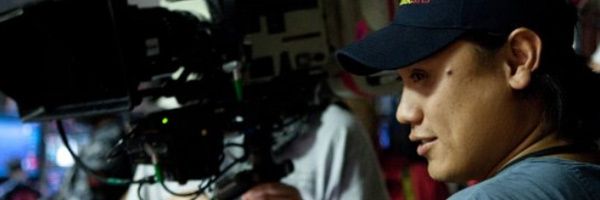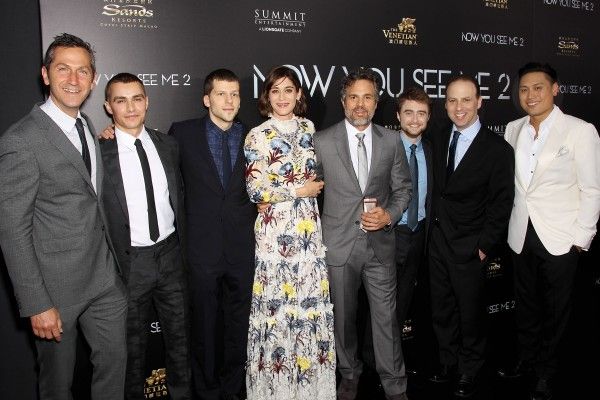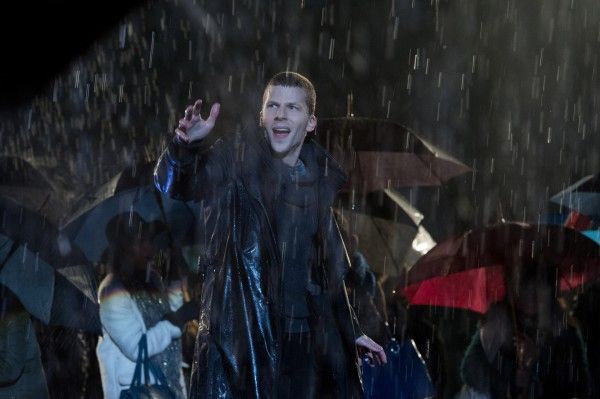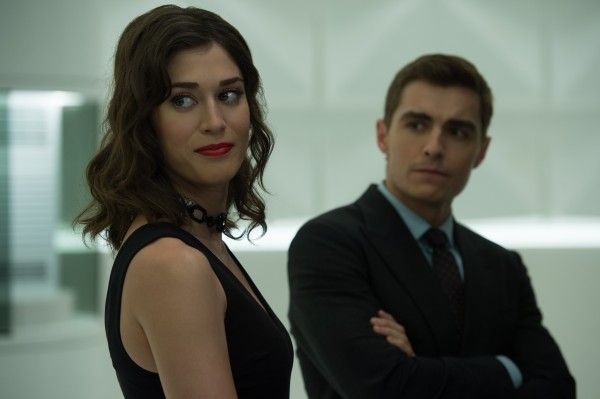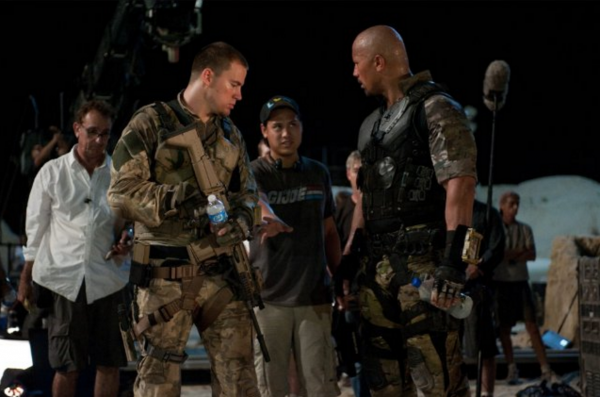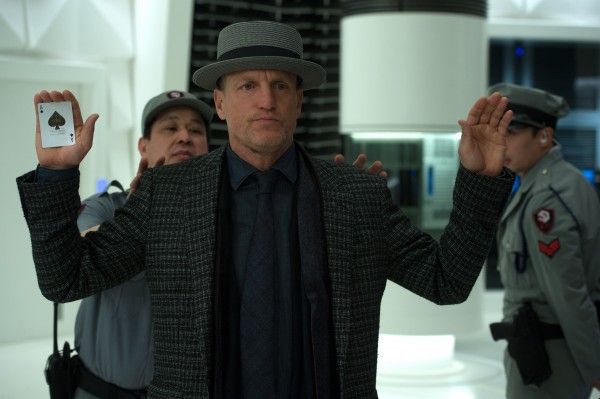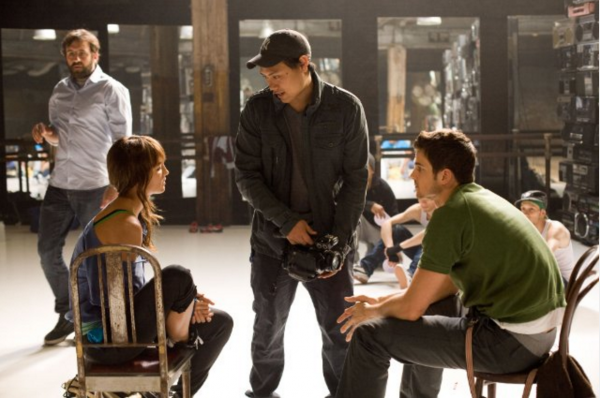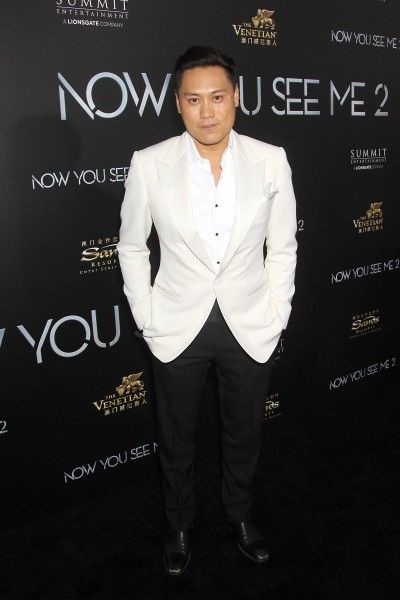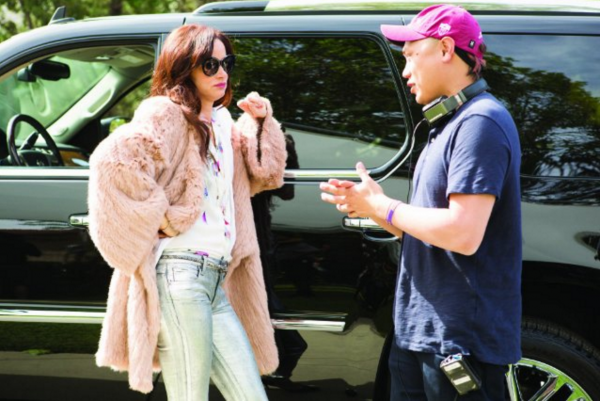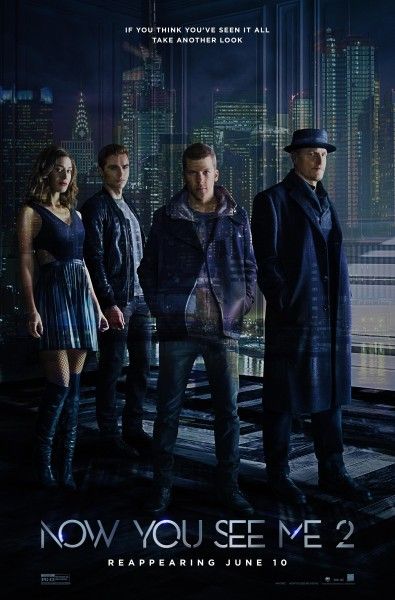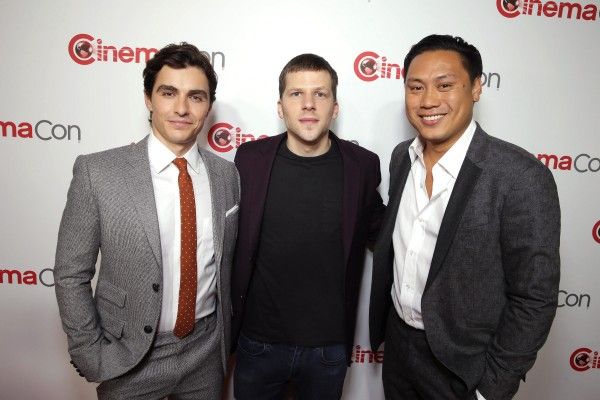Jon Chu is a hard director to nail down. While all of his films demonstrate an idiosyncratic enthusiasm, vibrance and musicality, they're a bit of an odd bunch side-by-side. His career kicked off with a dose of the magic all filmmakers dream of when Steven Spielberg called him in for a meeting fresh out of USC's film school. DreamWorks picked up his original music pitch titles "Moxie", and Sony signed him on for an adaptation of the classic musical Bye Bye Birdie. Though neither film ever finalized, Chu made his feature film debut in 2008 with the infectiously kinetic Step Up 2: The Streets, before becoming an early adopter of the 3D trend with the sequel Step Up 3D, and aligning himself with pop powerhouse Justin Bieber for the documentaries Never Say Never and Believe.
Then things started getting really eclectic. He took on his first studio actioner with the tentpole sequel G.I. Joe: Resurgence, contributed a short to Morgan Spurlock's collection of economic explainers, We The Economy, and took a bit of a dive with the ill-received Blumhouse Jem and the Holograms update. But now, he's onto his next studio franchise with Now You See Me 2, the follow-up to the surprise hit about a band of merry magicians known as The Horsemen who take a cue from Robin Hood, stealing from the rich and corrupt to give back to the everyday folk.
With the film arriving in theaters nationwide this weekend, I recently sat down with Chu for extended, wide-ranging interview. We talked about jumping aboard a moving train with Now You See Me 2, serving an audience who's always trying to figure out the trick, letting Lizzy Caplan get real weird as the latest Horseman, the movie's big cardistry set piece, and leading a cast of A-list talent including heavy hitters like Mark Ruffalo, Woody Harrelson, Morgan Freeman, and Daniel Radcliffe. We dug into the pros and cons of film school, why he likes making studio films,the franchise-dominated entertainment landscape, how Captain EO inspired him to make Step Up 3D, and a lot more. Check it all out in the interview below.
Collider: It's interesting when you're making a movie about magic. You have to combat the audience's always trying to figure out your trick.
CHU: Yes. That gave me a lot of sleepless nights.
I bet.
CHU: Especially because you have this architecture to your movie, and I'm not used to movies with very specific architecture. This one's like, almost mathematical what you need to show, pay off, not show, review, all these things. Then you have actors that you want to let loose because that's where the gold is, and then you have so much plotting too that you have to fit into a movie that's quick and witty and fun. All those elements are tricky. Then the whole time, you're thinking, "Is this just ridiculous in a bad way, or is this ridiculous in a good way?" and the audience, you know, is picking apart every single thing you're doing. You have to keep it away from that. You don't know until you ultimately show audiences over and over again to figure out, are we giving away too much here or there?
Right. Exactly, and magic is tough, because it's not just that people are trying to figure out your trick, but creating an air of magic in a movie is much harder than in person.
CHU: Yeah. Really, it shouldn't be in movies because you can cheat all across the board. We had to basically do a double to show the audience that we're not cheating, and so we tried to use as much practical magic as possible. Even Lizzy getting her head cut off, if that was any other movie, we could do it CG and it would be a really easy shot, actually, but this one, we had to create this couch. We had to do six weeks of R & D and have three other couches that we tried to do, and then we have to teach her how to pull this off. Then we have to teach the camera guys where to put the camera. Where is the perfect angle, and then how do we loosen it so it doesn't feel so tight? All those elements cost us much more money to do, but also was a promise that we made ourselves from the beginning of this movie, that it wasn't going to be hocus pocus magic.
Yeah, we're going to stretch things here and there, but for the most part, we wanted the audience to feel the legitimacy of, these are craftsmen, master psychologists, and storytellers that that's their super power. Not that they can make things appear out of nowhere for no particular reason, so that was a long thing. We all dedicated. Even Dave Franco doing the card thing at the end, or the three card Monte. He had to literally perform that in front of a live audience because we didn't want to cut because, if we cut, we could have put anyone on any one of those cards. We want it, so we hold on that shot, and if you watch it back, you'll see that we don't cheat. Maybe, if you could see actually someone maybe doing part of the trick or something in the dark, but really, you can't see it. He did it great. Those things, it just takes a little more effort on our part, on the actor's part. It takes a little more money, but that's part of the language of the movie.
You do have a pretty crazy cast. I felt the same way when I watched the first one. I was like, "It's so weird that they're all in this movie."
CHU: Yes. You would never expect, because they're all sophisticated actors in a very fun, out-there movie. I think that's what makes it unique. They embrace it and they ground it in a certain way, but then they can do things they don't get to do in other movies.
Absolutely. I think it's clear that they're all having fun, which makes it really fun for the audience.
CHU: Every combination, working with Mark and Morgan is a very different energy than working with Mark and Woody, which is very different way of working with Lizzy and Dave, and then you throw them all in a plane, and all the dynamics change. For me, it was a really good exercise in directing or getting out of the way or just feeling the room out and who bends to who, and who controls what. I think every filmmaker should go through that experience. I wish I had made a documentary about the whole thing. The best part of it was there was no divas. I expected one or two issues of some sort. Like, zero. I've never experienced a movie like that. Even with no movie stars, I've never expected a movie that went as smoothly.
Coming in with a group that had already bonded before, did that make it harder or easier for you?
CHU: It's intimidating. They probably did a lot of the hard work in the first movie of the tone. We didn't have to debate about tone, which I think is the hardest thing for an original movie like this, an original world like this to figure out what the right thing, what the audience wants, what they want as individual actors. So that was off the table, thank God. But, me, Lizzy, and Daniel coming in as the new fresh blood. Just dropping Lizzy in that group, the focus was not on me anymore. The focus was on her, and she shakes that whole world up. Everyone's trying to one up each other. She's like dirtier jokes than all the others, then Woody's like, "No. I'm the dirtiest one here," and then the Jesse is doing the wittiest joke. It's just this constant game that they all play with each other, and it was really fun. I had to cut out most of the jokes there, but that spirit is there.
You could feel them wake up. Had we kept the same group, I think it would have been a little more difficult for me to find where the new juice comes from. They were sparked differently in this, which was really fun.
Also, Lizzy is playing a very unusual character. It's actually one of my favorite things that I've seen recently because she's so off the wall. She's also allowed to be a romantic interest while being crazy and weird. It's very unconventional.
CHU: Yes. I think that was a struggle. It was a struggle, and also, she owned that. She came in and shook it up, and I kept wondering, is it too much? Is it not too much? She's fearless in that. She goes all the way, and ultimately, it just made you lean into it. The fact that she's a geek magician which loves blood and guts and death and decapitation added a really fun sort of element. She loved it too.
You know when she gets her arm cut off and all the stuff? We did a take, where literally, she's grabbing people's ... after they fixed her arm ... she grabs, and she's like, "You're such an angel," and she has blood all over her hand and she puts it all over their face and just touches everyone on the face. They're trying not to laugh, but it's the most disgusting thing I've ever seen. The whole place was just covered with blood. I think that rebellious sort of spirit is what the movie needed.
It does liven it up. You don't want a sequel to just be a re-tread.
CHU: Yeah, and it felt like, because she's a fan of the horseman coming in, it was almost like an audience member got to get thrown into this group. She got to question the weird things that are happening. She can be like, "Wait, so you're telling me, this whole thing is ... That makes no sense," and you're like, "Yeah it makes no sense. Let's keep going." I think she gave us permission to be on the audience's side and question or make fun of the odd elements in a movie like this.
It's one of my favorite female characters I've seen in a while.
CHU: Oh good.
You have a pretty unconventional resume of films.
CHU: Yes. It's very weird [laughs].
Yes. Is that by design, or are you just drawn to very different projects?
CHU: I think it's partly by design in terms of I love different storytelling. I love trying new things. I love when someone says, "You shouldn't do that movie," I'm like, "Hell yeah, I'm going to do that movie, and watch what I do with it." I love the challenge as a story teller. Whether you're telling a story around a campfire or in a commercial or in a Version America safety video that I did, or a dance movie, or documentary about a pop star, or an action movie, or magic movie, to me, that's what a storyteller is. You get to jump around and see how you are as a film maker, and I like that exercise of it.
Yeah, sometimes it works. Sometimes it doesn't, but I love filmmaking because it brings a group of people to enjoy a dream together, and they get to discuss it and do all these. For me that event of those things, I'm drawn to, whatever that may be. And I change as an artist too, what I like and what I want to try, want to play with. I like the evolution, that I don't have some sort of specific destination. Like I have that one movie that if I were to do, I'm done. That's not what I love about movie making. I love the process. I love the discovery of a world, discovery of myself. Any time I can play in a new world like that, I'm down to do. Hopefully I get better every movie, or I slowly sort of shift and change with that.
The thing that they all seem to have to me, from an outsiders point of view, is the opportunity for really engaging set pieces. Dance set pieces in Step Up. Action set pieces in GI Joe. That great card heist in Now You See Me. Is that something that appeals to you that you look for when you're choosing a project, or is that just a byproduct of what you like?
CHU: It's not definitely not on purpose. I don't feel like when I read a script I'm like, "Okay, what's my center piece of that?" Although I love those types of pieces. To me, those are the things when you walk out of a movie you remember, those events. I like those kind of things, and if you don't have some sort of prize moment in your movie ... I like to aim for those as well. With magic it was just something that the idea was around before of like, "Okay, they have steal this card that's the size of a playing card, and how would they get it out using their cardistry?" I thought that was really, really cool. I was like, "Rather than a big, elaborate set let's do it one room, so if you were to cut outside it's like nothing's happening, but everything is happening." The idea that's what magic really is. The most casual thing is the most planned thing beforehand, and you would never guess on the thing. I love that idea of that. That's how that evolved.
I think that in all my movies, whether it's music, or dance, or action, or magic in this case, they're all languages, and language in how we communicate how a character evolves, or how emotion is feeling in this moment. For me, it was really fun because these magic pieces fit into where a musical piece would be in a musical, and we could discover those things. In these moments, these climax moments of this language it's the poetry moment of that. In GI Joe, when they're all swinging on the mountainside, to me, it's like, "Now that you understand the language of action how can we do it in a way that we're playing jazz, and we're just coasting, and doing some change ups, and improving some parts?" Not actual improv, but the idea of feeling that looseness of the language in its full blossom. Again, subconsciously, but these moments have happened through that idea.
What's also very cool about that set piece, the card set piece, is that it's a really refreshing change of pace from explosions and destruction. It's clean and precise, and it's not throwing a car through a building or exploding a nameless downtown.
CHU: For me, it was more like the first movie a spectacle. It was on stage. It was a show. They're moving the camera [all the time]. I don't think the camera stopped ever for the first movie. What's interesting to me is the different perspective of that idea is now that movement's a part of the language of this movie let's only use movement when we absolutely need to. Let's go onto the other side of the curtain where these guys are talking about the philosophy of magic, and using their understanding of magic, and getting out of a magic trick themselves. I love that flip of that.
Actually, the idea of the card sequence is probably something that really drew me to understand the whole identity of this movie was that you can have the spectacle, and the flourish, and wonderment of the first movie without doing a big show on stage. We're going to do it in these little moments. Similar to Ant-Man style. They're going to be little things, but all the intricacies of how to make that work, let's make the whole movie in that bringing magic off the stage and onto the ground level. That's drew me in in the first place anyway.
That's an interesting technical take on the camera work. You seem a pretty technical minded director. Something I always remember is when Step Up 3D came out, 3D was just becoming this huge thing, and it was used mostly for action movies or horror movies. I was working at the movie theater in my college town, and everybody's like, "Did you see the 3D in that movie? That was the best 3D all year. Didn't really expect that from a dance movie."
CHU: Oh, that's great. We spent a lot of time on that 3D. We were early. Avatar was still shooting. We just finished shooting, so we were using the pace systems and the machinery, and nothing was really set yet. Everything was still raw. We could not use a steady cam with our cameras because it was too heavy, and the city cams weren't built there yet. There was so many unknowns, so we paid a lot of attention to that.
Captain EO wasn't out back at Disneyland. It was kept in this vault. I think for these legal reasons. No one could ever see it, but because I had done Step Up 2, Disney released that movie, so they were like, "Hey, what can we do. Let's celebrate," after they released it. I was like, "I want to take my dancers to see Captain EO, and I know you can't see it anywhere." They were like, "Okay, let us figure that out." They were like, "You can go to the Imagineers warehouse, and we'll set up a whole thing." All our dancers are young. They're like 19, 18, 17 years old, and so they hadn't ever seen Captain EO in person. Maybe on the internet here and there. We brought like 30, 40 dancers to the warehouse where there's broken, old Imagineering rides, and stuff. We go into this warehouse, and they have the original film, this like 80-year-old projectionist, who's stringing it up. We have the purple 3D glasses. Again, this was before they ever put it back in the theaters, and it was the old print. They had fold out chairs, catering for us, and it was one of the most amazing moments. One of our kid's dad is in the movie. He's one of the dancers in it.
It was one of those things that we watched twice. It broke one time, so then we watched it again, and then we watched it again after that. That's when I was like, "We have to make Step Up in 3D. This is so fun." That was the inspiration for a lot of that.
Oh, that's really cool. Gosh. Wow. That was my shit when I was a kid. I grew up in Orange County...
CHU: Oh, you did? [Laughs]
So I spent a lot of time at Disneyland.
CHU: Oh, nice. It's funny because we went back after they released it back to the park for a while. The print is so bad at the park. The 3D was way off. I don't know who checked it, but the way we saw it was much better than when they put it in the park. There's something messed up in the print. I don't know what it was, but every time I went back I was like, "Someone's got to check this shit."
Yeah, no kidding. Preserve the film! You went to USC for film school. How do you see film school as a director? How it shapes you more than some. Some directors just start making movies and go from there.
CHU: I don't think film school's for everybody at all, actually. I think it depends what kind of artist you want to be, what kind of movies you want to make. Studio movies are very specific, and I would say most people wouldn't not necessarily even be satisfied doing study movies even though you get movies releases and all this stuff. In film school, at least at USC, from my own experience, it was really helpful for me not because of what they taught necessarily -- although it's not a trade school. They'll say that straight up. You're not learning how to edit. You're not learning how to work that camera. They're like, "You can go on set. You can read a book, whatever, but we're trying to teach you audio/visual grammar." Anyone can write a sentence. You can see it in a book of writing, but how do you write a paragraph that goes against the grain, comes back around, makes a point, whatever it may be. All those little intricacies. We're going to study films. We're going to talk about them. You're going to try some experiments. We're going to do all this stuff to understand that.
I learned on that level, but more than even that ... Forget that. You can learn that also. It's the community that I came into. These people who love movies more than I did, who made more movies than I did, who were better than I was. You feel like, "Oh, I'm not the only one. I'm not the film nerd in my class anymore. The guy who does all the class videos, or the wedding videos." There's a higher calling, and people actually have more messages or different messages, and you see everybody coming in fresh and excited. Then you get this good, old community of friends that you help make their stuff, and they help you make your stuff. In any other situation you can't find those people.
If you work in the industry, everyone's going to want to get paid for their work. At this point, everyone's just fresh and trying to find their voice. You feel like you can do anything and you're going to say the most important thing in the world, and I think that's an important exercise, to feel the power that that gives you. Also, the community of friends are going to help you build the thing that you can build, or you're going to help someone else build that things as well. Those people I still work with today and I love. I could not, having no connections in Hollywood ... I don't even have an Uncle some place. Zero. It is what allowed me to have some sort of road in.
Makes sense.
CHU: I can't believe my parents. My parents helped me out paying for college there. I don't know why. You come out with a film degree, so I'm not sure what that does for you, but they did, and somehow it worked out okay.
That's great. You didn't get the, "You should probably be a lawyer or something"?
CHU: Yeah. No, I didn't actually.
That's great.
CHU: I was pretty lucky about that. Although they probably should've said that to me.
I think you're doing okay.
CHU: Oh, we're doing okay. We're doing good.
They made the right choice in the end. Although I know it is scary. I have friends who went to graduate school for arts degrees, and now they're turning 30 or 35, and they're like, "Oh, my God. Oh, what did I do?"
CHU: I would say like 95% of the people in my class are no longer in film.
In the industry?
CHU: Yeah. I think it's hard because at a certain point, it's how long can you survive? People who don't have a family that is there for them in the middle of those things ... You have to be able to survive 10, 12 years to get your start.
Totally.
CHU: That's if you actually have talent, and the normal things just happen. You're going to get lightning in a bottle, get that opportunity, but pretty much you have to be able to survive that long and be okay. I think that that's a big problem of why there's not enough diverse voices as well because you have to have certain resources to be in this business to begin with. To have my family be able to help me at school, not many people get that opportunity anyway, let alone people with diverse voices that we need. It's a hard one, and luckily technology's changing some of that. Even that, you can do stuff on YouTube, but professionally on the studio side of it, to survive it takes even more than that, which is kind of a crazy conundrum.
That's such a good point. You were saying earlier that a lot of people would not be happy making studio films. Why is that something you like doing?
CHU: I grew up watching movies in the movie theater. I grew up living the spectacle of seeing Batman for the first time, and having the soundtrack, and listening at home, and playing with the toys, and imagining my own world. I love ET, and Jaws, and those things where it was an event, and everybody got to celebrate it. Disney animated where you got to learn all the songs. To me, it let me escape. It gave me a voice. It gave me all these things, and allowed me to interact with my family and my friends in way that was magical. I love that side of it.
When I think of movies that I want to do those things comes to mind. Those event ideas are something that I get very excited about. I love pop culture. I collected from POGs to Tamagotchi's. I don't know why, it's a weird thing. But I love talking about it, I love knowing what's happening, and so I'm drawn to those things if they have something that I can personally bring to it. It just a fun escape for me, so that's why I'm so drawn to that, but at the same time as I get older too I realize the power of the medium and the idea of being able to say something even more than that.
To me, it was never about selling a product. It was about selling imagination. Selling this idea that, "Oh, I could be that. I could go and create my own world with those toys." I appreciate that. I really exercise my creativity from my toys. Which was at some point probably a product that was sold to me in some way or another, but it gave me a voice when I was shy kid, so I appreciate those things in intimate way.
It's interesting, too, because I think that mindset is probably sort of helpful in the way that you seem very comfortable working in either franchises or potential franchise starters, which a lot of filmmakers I don't think are very comfortable in that area. It's just a fact of the business now. Even if it's an original they're like hoping there won't be six more after it.
CHU: Exactly. Which is a shame at one level, ...
It is. And it isn't.
CHU: But at the same time those are the things I love, so it's perfect for me.
I'm the same way. I like really high concept genre films, so sometimes I'm ok with it. I don't know if that makes me a bad film fan [laughs].
CHU: There is a balance for sure.
Absolutely.
CHU: I still want all the other movies that I want to watch and see what other filmmakers are doing that are interesting, and different. I want to be able to do one for myself when I want to do that, and when I want to do that, and at the scale that I want to do that. I think that's what interesting about the art, it can span a lot of things. So when franchise movies and superhero movies are taking over much more space and resources than it needs to be, that's worrisome, but at the same time entertainment is entertainment. You're either getting an audience or you're not, so how are you going to get more audience? If Netflix is the way to get more audience, people to watch this certain genre than that's the way it goes, and that's the way it is. It'll be very interesting to see how it all happens.
Before the movie even came out, I think few months ago even it was Now You See Me 3 is already in the works. How much does that affect what you guys are doing on 2?
CHU: We were done. Were basically done with it already. I think, in a way, it was a vote of confidence to us, but at the same time nothing's a go until it's a go. That's the reality. I've been in the business long enough. I've had plenty of announcements that never went anywhere. It just means that we're starting to talk about what that script could be like. What could that world be like? Is it worth even going there? That's a whole other discussion. Depending on if the audience even comes out. All those announcements are great and all, but they're really for people to read and enjoy as entertainment rather than an actual ... We're not definitely making that movie no matter what.
Well, yeah. Even sometimes once a movie's started filming it can not happen. Until it hits theaters it's never a done deal.
CHU: It always feels a little bit ... When we read the article like, "Oh, they're making Now You See Me 3." I was attached like eight months so, so when the announcement comes out, it feels like an event, but you're like, "Well, we've been talking about it forever to do one. Yeah, I'll be attached, and these are the kind of ideas we're playing into." It's always interesting with that.
It wasn't one of those things where you were shaping 2 with an idea for 3. It's more contained.
CHU: Yeah. I think if they're doing a number 2, you're always thinking about a number 3 no matter what.
That's true.
CHU: Why would a number 2? We live in a world where everyone wants the freaking universe.
That's true. It's the magic shared universe.
CHU: It's hard in this one though because you don't have any resources to go to. I can't turn to a book and be like, "What did they do for the third and fourth? Did they do a spin off on that one? Oh, that's a good idea. Let's take that one." I'm like, "What are we going to do with the eye in this next one? How are we going to pull that off? We have to go crazy, and then what's going to happen with ... Where did Isla go again? Who? What? Where?" All these thing. Like, "What's down that staircase?" Those are scary questions to tackle, but it's also really fun.
The eye is tricky because you want it to have an air of mystery, but you have to provide some answers.
CHU: Yeah, and you cannot push it through the third movie. You could probably push it to the third movie, but we've got to deal with what that is, and then we make of choice of how magical is this movie. All those things that we punted a bit, or played around like, "We know. You don't." We actually have to lay it down, and that's a little trickier, for sure.
I know a lot of people don't like to say straight up what their dream project is, and I understand that. It's a little personal nugget, but are there certain genres, or things you have done yet that you really want to get your hands on?
CHU: I want to do a lot of stuff. I want do a dinosaur movie, a robot movie, an alien movie. By the time I'm dead in my coffin I should have those three. I don't know what those are yet. I don't know where they'll come from, but to me, at least that. The process of making a movie is so fun, and sometimes, for me as an artist, that's why I do it is the process and the making of it. Maybe the studio doesn't want me to say that I don't care if people show up or not, but they can't be the reason why I do it. I look what for the process may be like, and what do I not know. If it scares me a little bit, or it makes me question, "Would I even be able to do that," I usually jump at that chance.
Coming into Now You See Me 2 was scary too because I'm like, "These actors are big. They're going to bully me. They're going to be like, "Who the fuck does this guy think he is? What did he do? Justin Bieber?"" It was very scary. I'm in for like two years of torture, but you know what? I think I'm going to learn a lot through this. That really scared me, and so that's half the reason I was like, "I've got to do. I've just got to do. Fuck it, what's going to happen? I'm not going to die. Nothing's going to happen." They were so kind, and so generous, and so true and open to me. It is one of the best on-set experiences.
No Bieber jokes?
CHU: Sure, Bieber jokes all the time. Woody watched all my movies, and he really loved Never Say Never. He was crying watching it or something. He really loves Bieber. He was like, "When can I hang out with Bieber? When are we going to go to Atlanta? Let's go." The more movies I do the less Bieber jokes I get.

